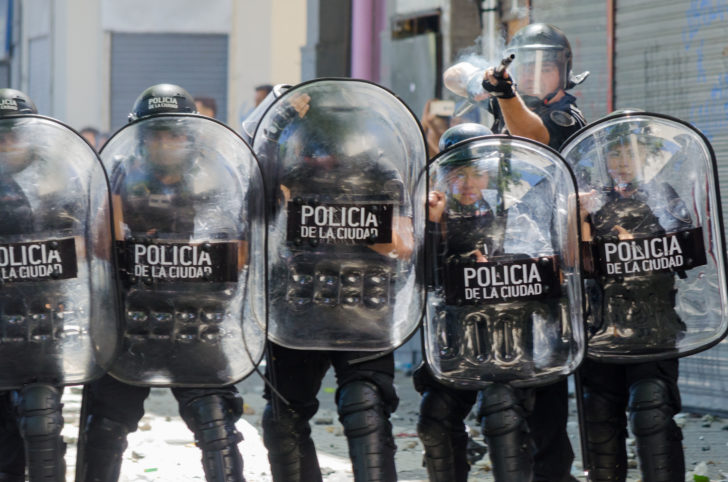Five people who were detained on December 14, during protests against a pension reform in Argentina, remain incarcerated under the authority of federal judge Claudio Bonadío: Diego Parodi and Pablo Giusto, arrested just outside a police station while demanding the release of others arrested; Juan Salomón Vallota and Sebastián Giancarellil, two homeless men arrested during the repression; and Esteban Rossano, who was also arrested during the demonstration. In this last case, his family denounces that the case against him was fabricated, since the 19 year old did not participate in the protest.
According to the judicial branch, these people remain deprived of liberty either because “they couldn’t prove their place of residence” or because there is still no full understanding of what happened, since the investigation to define responsibilities has not concluded. That is to say that they were detained in order to start an investigation, and not the other way around. According to the judge, detention is “the only viable option to guarantee the goals of the (judicial) process,” but he gave no more specifics about how they could obstruct it. Speaking about Giancarellil, the judge alleges that he cannot be released because he has a criminal record. An appeals court confirmed the rejection of the releases, arguing the investigation was not over and that they could obstruct it – also without specifying what it was referring to. The accusations are for the crimes of assault and resisting authority, damage, injuries, riot, inciting violence, and public intimidation. All of the detained were investigated but the resolution of their procedural situation is still pending.
A common factor in the five detentions is that in no case have the judges given a clear and specific description of the behaviors they are accused of, based on evidence that could be contrasted by the defense lawyers of the detained. Nor has it been explained why the cases continue to be processed under federal jurisdiction.
Separately, César Arakaki remains detained since December 18 and Dimas Ponce, who voluntarily presented himself before authorities on January 9, also continues to be detained for events that took place on the 18th. They are accused of the offenses of attacking and injuring police, public intimidation and aggravated assault on an authority. They were denied release and exemption from prison for the expected penalty, on the presumption that they will try to evade justice – despite the fact that Ponce put himself at their disposal – and that they could impede the normal development of the process due to their supposed (and unexplained) connection to Sebastián Romero, who is currently a fugitive.
Given the current summer judicial recess, everything would indicate that these seven people will continue to be detained until at least February.
The initiation of federal criminal cases in the context of repression of protest, in which prolonged detentions are upheld with weak arguments, implies very worrisome processes of criminalization. Without a doubt, this serves as a deterring message that seeks to demobilize society. At the same time, the judicial branch continues worsening the deterioration of the conditions in which criminal processes unfold, a situation validated by many higher judicial bodies. This situation makes it even more difficult to exercise the right to defense and to demand that the rules of due process be respected.
We thank Javier Valente for the photo published above (taken on December 18, 2017), and ask that the source of the image be cited.

